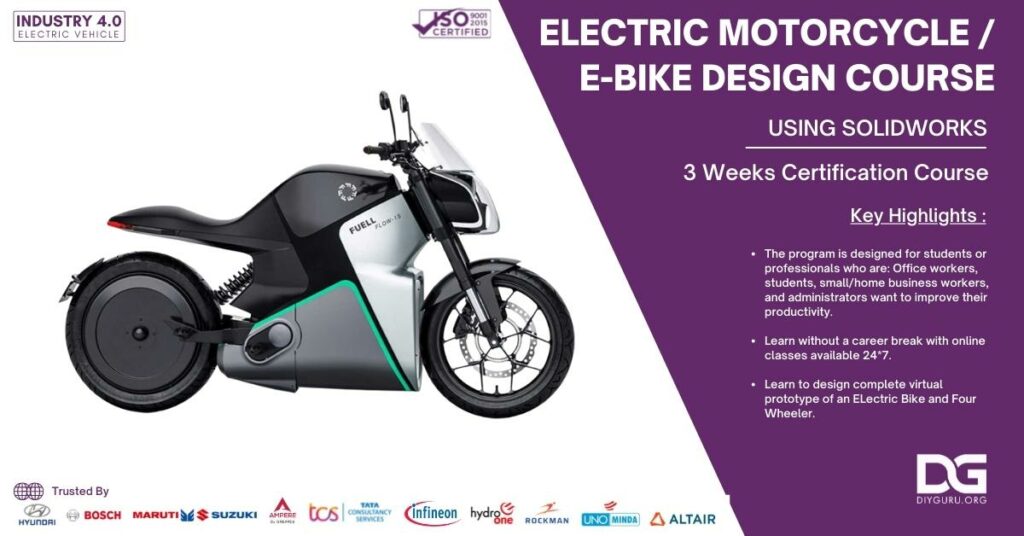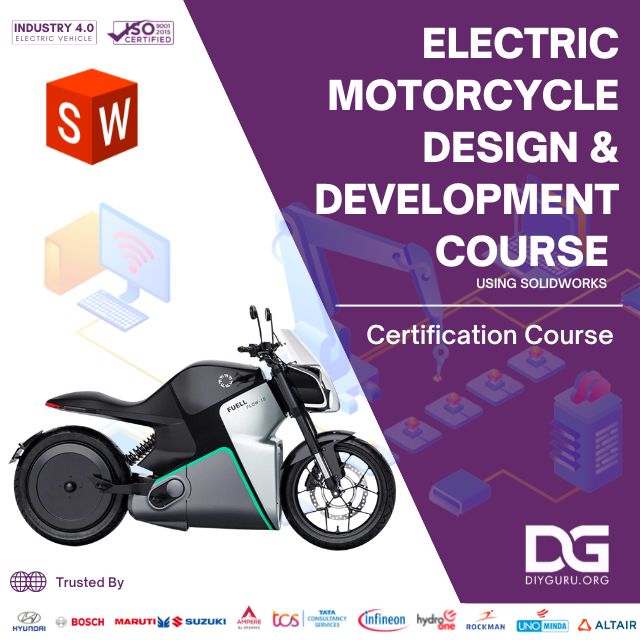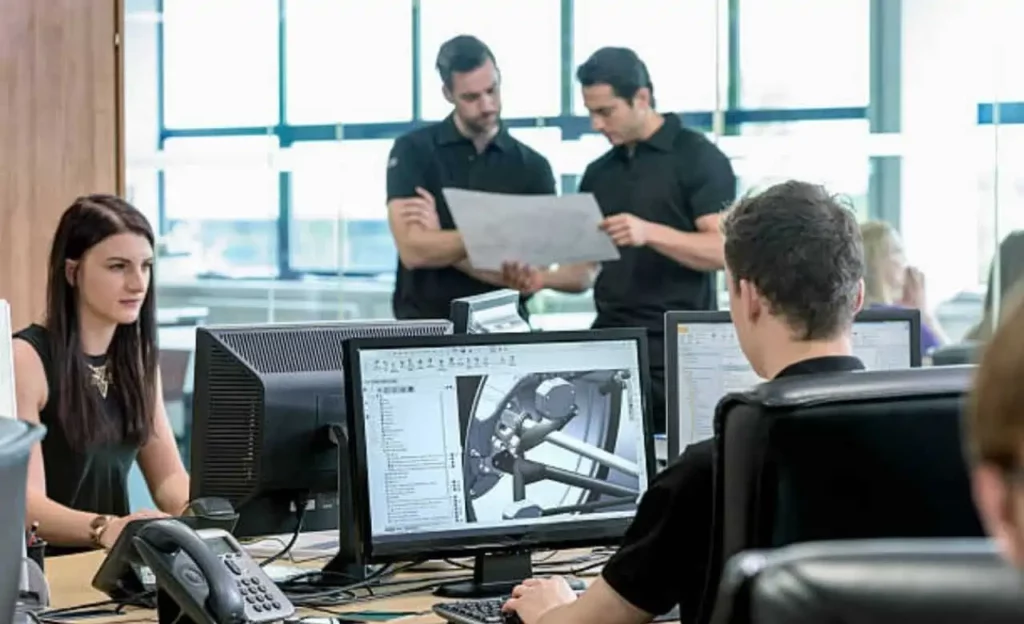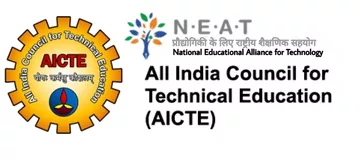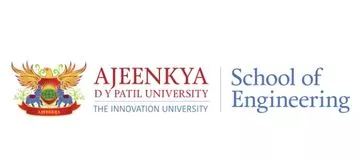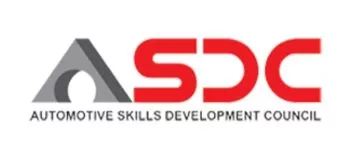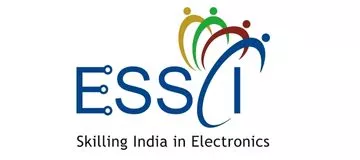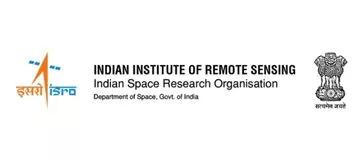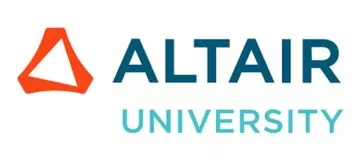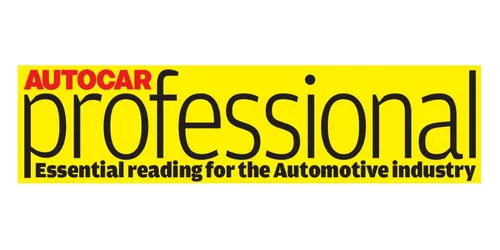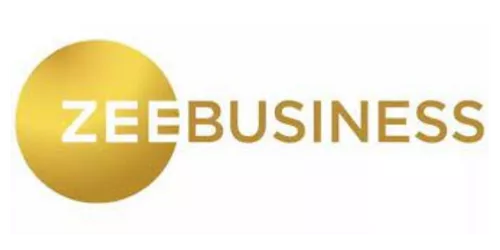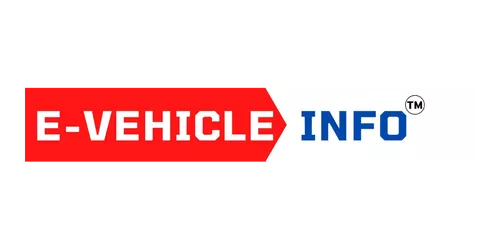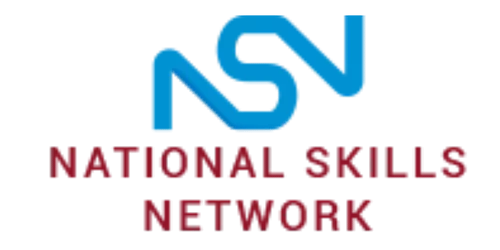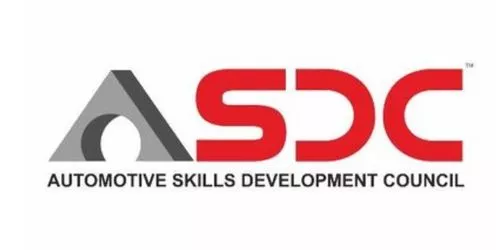Solidworks (Project Based Approach)
With One Month Internship Project


Electric Motorcycle / E-Bike Design using Solidworks
Prototypes can be individual parts or complete cars, and once they’re built, they can be put through their paces to see how well they do and, in some cases, tested to destruction if necessary. Traditional prototyping was a slow and expensive process because, even with the best engineers, theory wasn’t always borne out in practice. The constant back and forth between drawing board and prototypes was costly and enormously time-consuming. Computer-aided design (CAD) and computer-aided engineering (CAE) for designing and simulating the performance of products changed things entirely, with the inevitable consequence that cars can now be engineered, prototyped, and tested in a virtual world before any physical prototypes are built. Manufacturers can get closer than ever before to the finished result before prototypes roll into a wind tunnel or onto a test track
DIY Project
Every DIYguru course comes with a Do It Yourself project which you can do and learn by doing at your comfort. Our goal is to make sure you are able to implement your learning in real-world scenerio
Internship
Every candidate after successful completion of the project submit a pitch presentation video, explaining his/her project-oriented achievements and results, which enables them to do one month of internship with us.
Certification
We are the only platform in india approved by National Education Alliance for Technology - NEAT, AICTE, Ministry of Education, Govt. of India along with Automotive Skills Development Council.
Understand the EV modelling using SOLIDWORKS
Acquire deep knowledge in EV System architecture with thorough understanding of components in Electric Vehicles.
Benefits of learning from DIYguru
Proactive Program Support
Dedicated Program Manager to solve your queriesDual Certificate from Govt. of India
Avail certification from ASDC & AICTE, Ministry of Education, Govt. of IndiaLearn anytime anywhere
Learn through online videos by world class faculties.
DIYguru alumni are working at various roles in
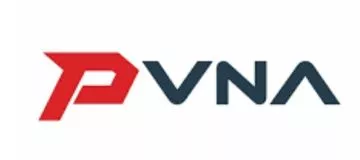
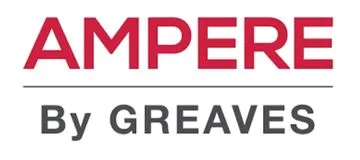


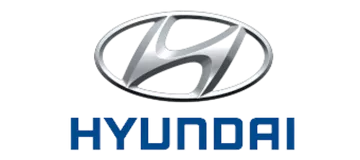
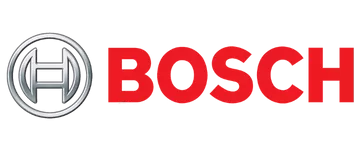
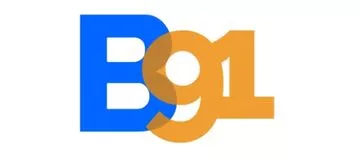
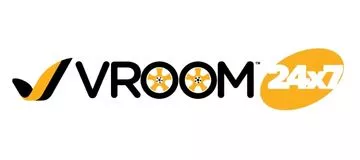

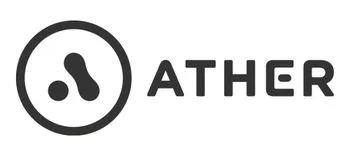
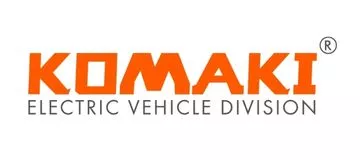
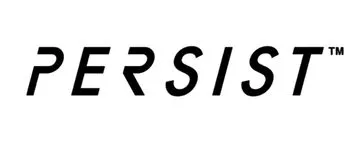
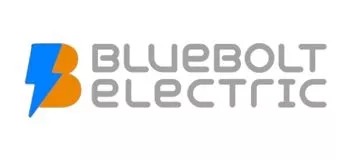
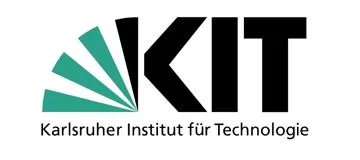
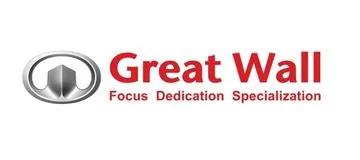

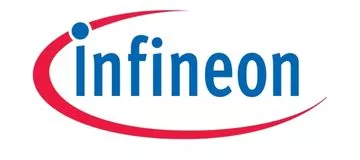
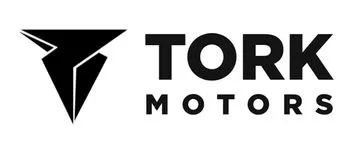
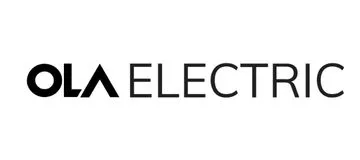
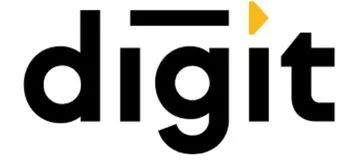

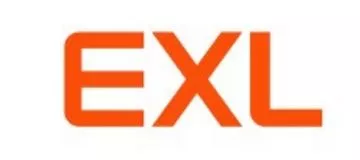


Who is this program for?
- Having a Diploma, BE / B.Tech or equivalent in domains such as Automotive, Mechanical, EEE, ECE, Instrumentation, Mechatronics.
- Designing enthusiasts (No academic qualification mandatory)
- Working in industries such as Automotive, Auto component, Design, Manufacturing, etc.
- Working in Functional areas such as R&D, Analysis, Maintenance, Projects, component design, etc.
- Interested in pursuing further studies on the part-time or full-time basis in Design and Engineering Sector.
Specialized roles one can apply for after doing this course
This programme is tailored to help you improve your engineering skills as a student, recent graduate, or working professional with following expertise.
- Casing Design / Solidworks
- Design Engineer (SOLIDWORKS & ANSYS)
- Structural Engineer
- Furniture Designer
- Product Designer Intern
- Junior Structural Engineer
- Solid work design manager
- Mould Designer
- solid works Designer
- Surface modelling in Solid works/Fusion 360
- Design Engineer
- Solid works Automation
What will you learn?
- Demonstrate competency with multiple drawing and modification commands in SOLIDWORKS.
- Create three-dimensional solid models.
- Create three-dimensional assemblies incorporating multiple solid models.
- Apply industry standards in the preparation of technical mechanical drawings.
- Create Simulation of the assemblies incorporating multiple solid models.
Languages & Tools Covered
- SolidWorks,PhotoView 360
Major Highlights – Syllabus
- The course deals with the creating and designing parts, assembling models and product development using Solidworks. It goes through a complete walkaround of the software user interface, tools, commands and operations to enhance your skill as CAD Design Engineer
- The course starts with basic introduction of software and its implementation and application in various fields and industries. The course is focused on complete automobile product development from the initial sketch to final assembly.
- The course will optimise your skills and will make you competent for Solidworks Associate (CSWA) and Solidworks Professional (CSWP) certification exams.
- The first module covers the designing of an electric scooter starting with the development of chassis design on a two dimensional sketch with considering vehicle parameters. Then adding structural members to the 3D sketch or a wireframe design of the chassis.
- The next videos cover the braking subsystem, suspension system and powertrain designing. The final videos consist of assembling the design parts in bottom down assembly configuration and rendering the final product.
- The Electric Car module covers the design and development of an electric sedan. The videos starts with the phase of chassis development, suspension system, steering system, braking, powertrain and drivetrain.
- All the vehicle parts of subsystems are designed individually and then assembled to form the subassembly. The latter also include designing of a monocoque chassis using surface and solid modelling.
- The complete outlook of the vehicle including the interiors is modelled using surface design. The subassemblies are assembled using constraints and configurations in Assembly mode of Solidworks.
- The vehicle is featured with exploded view and animation with rendering. The course also includes chain sprocket design with Assembly in Solidworks.
- DIYguru course also offers BAJA and FSAE vehicle development modules for SAE event preparations which will aid the students for their competitions and upskilling them in their team. The modules cover the required design and simulation according to the rulebook parameters using Solidworks.
Stepwise procedure for the course enrollment
- Step 1:
- Apply for the internship-based learning-based course.
- Step 2:
- Pay the necessary fee to enroll in the program.
- Step 3:
- The technical team of DIYguru will check your entered data, and will share the confirmation of acceptance as you will be shortlisted in the next 24 hours.
- Step 4:
- Once you are enrolled in the course, start working on the course videos, and given assignments, and complete the course at your own learning pace!
- With this, you shall receive the ‘course completion’ certificate.
Process for 4-week internship project
- Step 5:
- Once you complete the course, the DIYguru technical mentors will contact you to enroll you in the ‘live project’.
- Since students will work on a live project, students will get enough time to prepare themselves before the internship project begins.
- Step 7:
- It is an ‘internship’ based project, and the students will be encouraged to work through the assigned project in teams and will be allowed to achieve the results on their own, with mentorship support from DIYguru!
- Allowing you to gain the actual skills as an ‘intern’! Enrolled students will get a minimum of 4-6 weeks to work and submit their project reports.
- With this, you shall receive the ‘internship project completion’ certificate.
Detailed Curriculum
- Introduction to Solidworks
- Rear shock absorber part 3
- Swing arm scooter
- Two wheeler tyre
- Two wheeler alloy wheel
- Front suspension Scooter
- Disc brake rotor Scooter
- Hub motor part 1
- Hub motor part 2
- Hub motor part 3
- Motor controller scooter
- Handle bar scooter
- Scooter Assembly part 1
- Scooter Assembly part 2
- Front Panel Scooter
- Scooter Headlight
- Front mudguard
- Middle body panel part1
- Middle body panel part2
- Rear body panel scooter
- Taillight
- Swing arm panel
- Modified taillight
- Editing scooter mask
- Final assembly scooter
SOLIDWORKS – Design, Drafting and Simulation
- Solidworks E Bike design
- Solidworks Electric Vehicle Design
- Solidworks for Formula SAE
- Solidworks for BAJA SAE
Program Highlights
Self Paced Online Course
Learn from Industry Experts
Guided projects
24/7 Lifetime Support
+ Internship Projects included with this course
Design and assembly of an electric 3 wheeler.
Design and assembly of an electric 2 wheeler.
Design and assembly of an electric 4 wheeler.
Download the project list of project eligible in this course
Interested in doing live project?
DIYguru welcomes you to be a part of 1 month live project with a personalised technical mentor support.
Get the full curriculum
Download the full curriculum with topics and units explanation attached with the set of DIY Projects in this course.
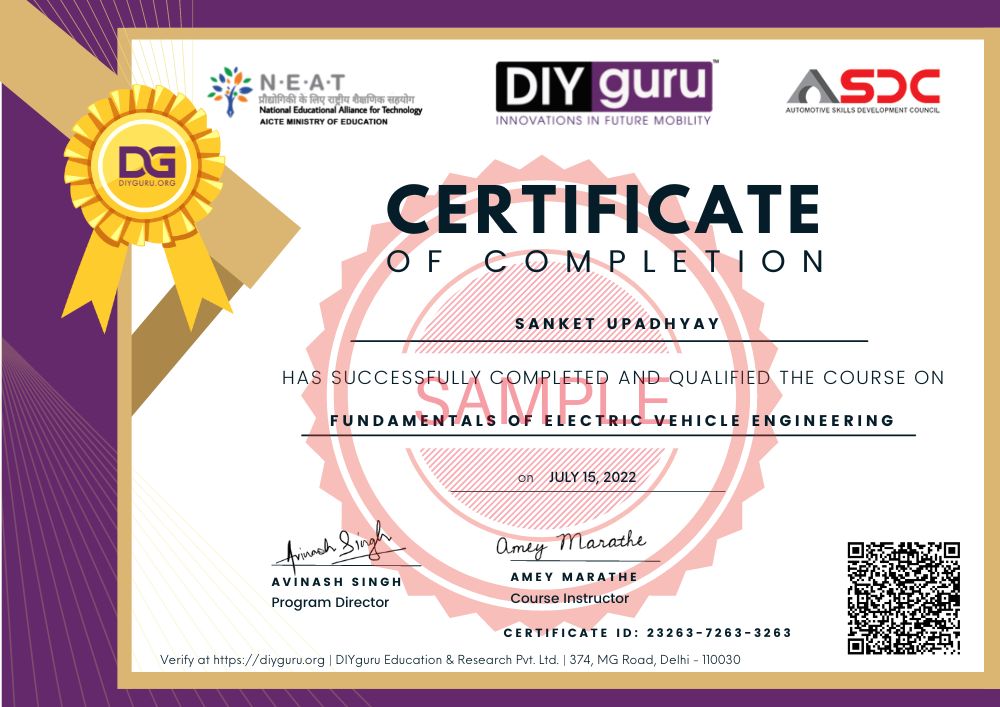
Sample certificate
Electric Vehicle Global Verified Certificate
Certified by ASDC, Automotive Skills Development Council & NEAT, AICTE, All India Council for Technical Education, Govt. of India
Learner Stories
Hear #PowerAhead stories of career growth from our learners
“DIYguru has helped us a lot in improvising the concepts of electric vehicle design & engineering for our experienced and fresh employees. The trainers are of high quality and knowledgeable in terms of delivering the contents and making things understandable. We look forward to having a continuous relationship.”
| R Shashi Kumar, Head HR – Robert Bosch Engineering
Learners love DIYguru
Here’s what some of our 40,000+ satisfied learners have to say about studying with DIYguru Team.

"Very informative course, high quality in terms of quizzes and assignments, liked the project at the end of the course. Oh, and great support. Can recommend this one to my friends and colleaugues. Being the very first player in EV industry, DIYguru has been crucial to the EV ecosystem development in india"

"I have known DIYguru since 2013 when the first version Autosports india was launched and in last 6-8 years the platform has emerged as the leading maker's learning platform in india. Form me the team behind DIYguru has been the best support all through the journey after Bachelors till my master's"
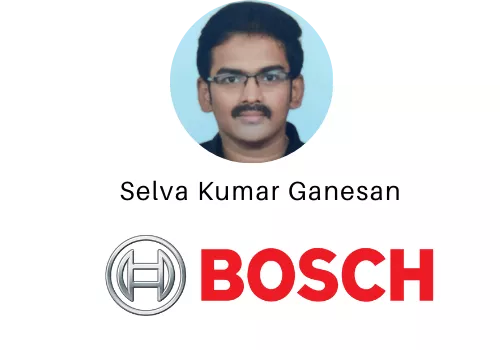
"Some of the best customer service I've ever seen. Great platform for mechanical and electrical engineers to learn EV!"

"This is truly a 5 star experience for youngsters in india! keen to learn about EV Technology"

"The platform has helped me personally to build my career in renewable energy in Canada. Hope to see DIYguru in Canada soon. Five stars!"

"liked the course with wide range of calculations in EV, all tutors are very supportive."

"Automotive design with incredible knowledgebase in terms of support from Baja Tutor community of DIYguru is wonderful experience. Documentation on the web is also good. "
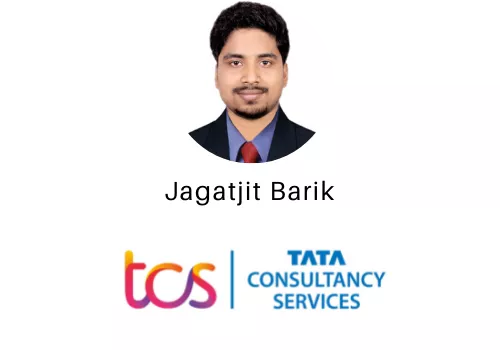
"Amazing content and great support from DIYguru community"
Recent Placements
Avg. Salary Package > 3.5L
66% Alumni Career Transitions
73+ Hiring Partners
50% Average Salary Hike
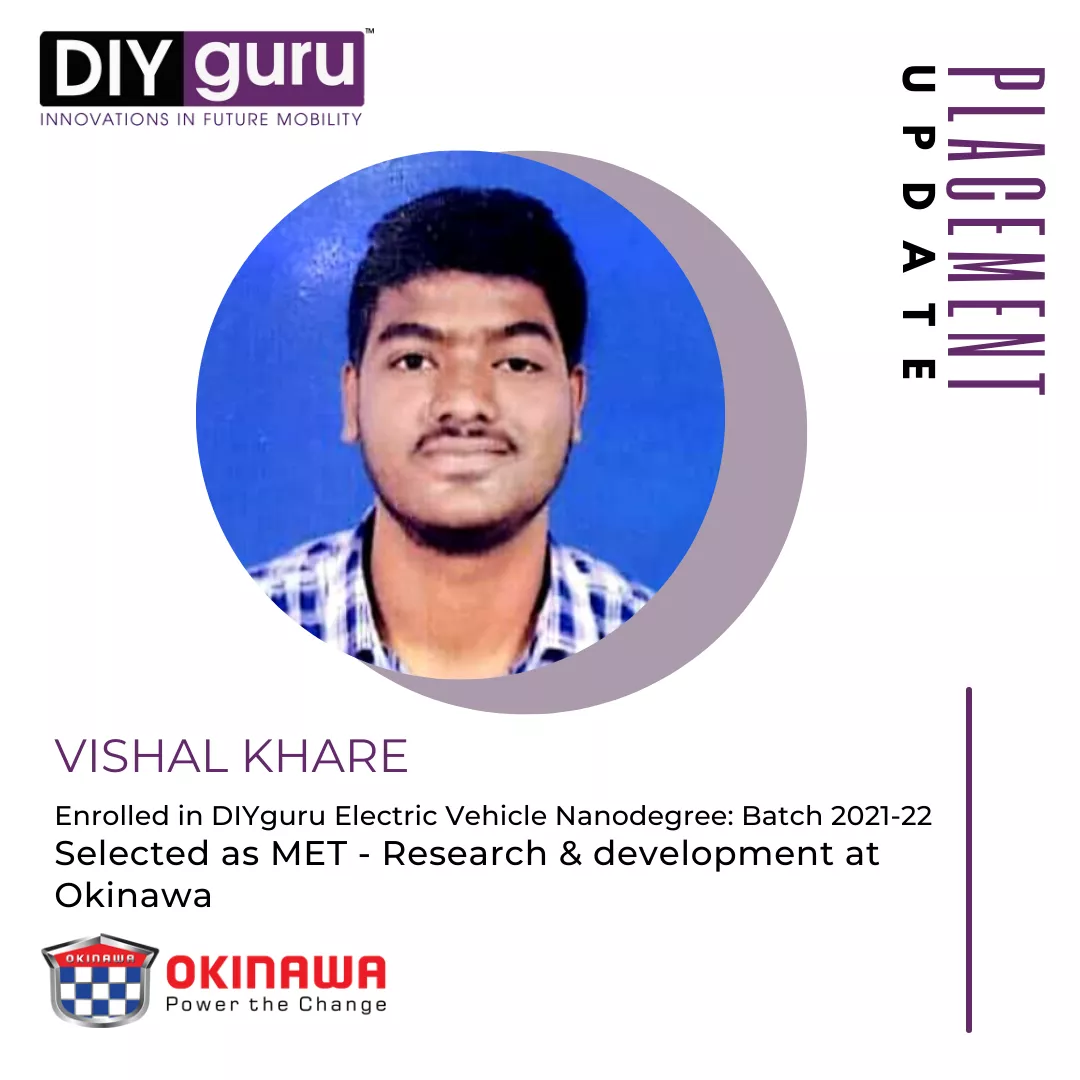
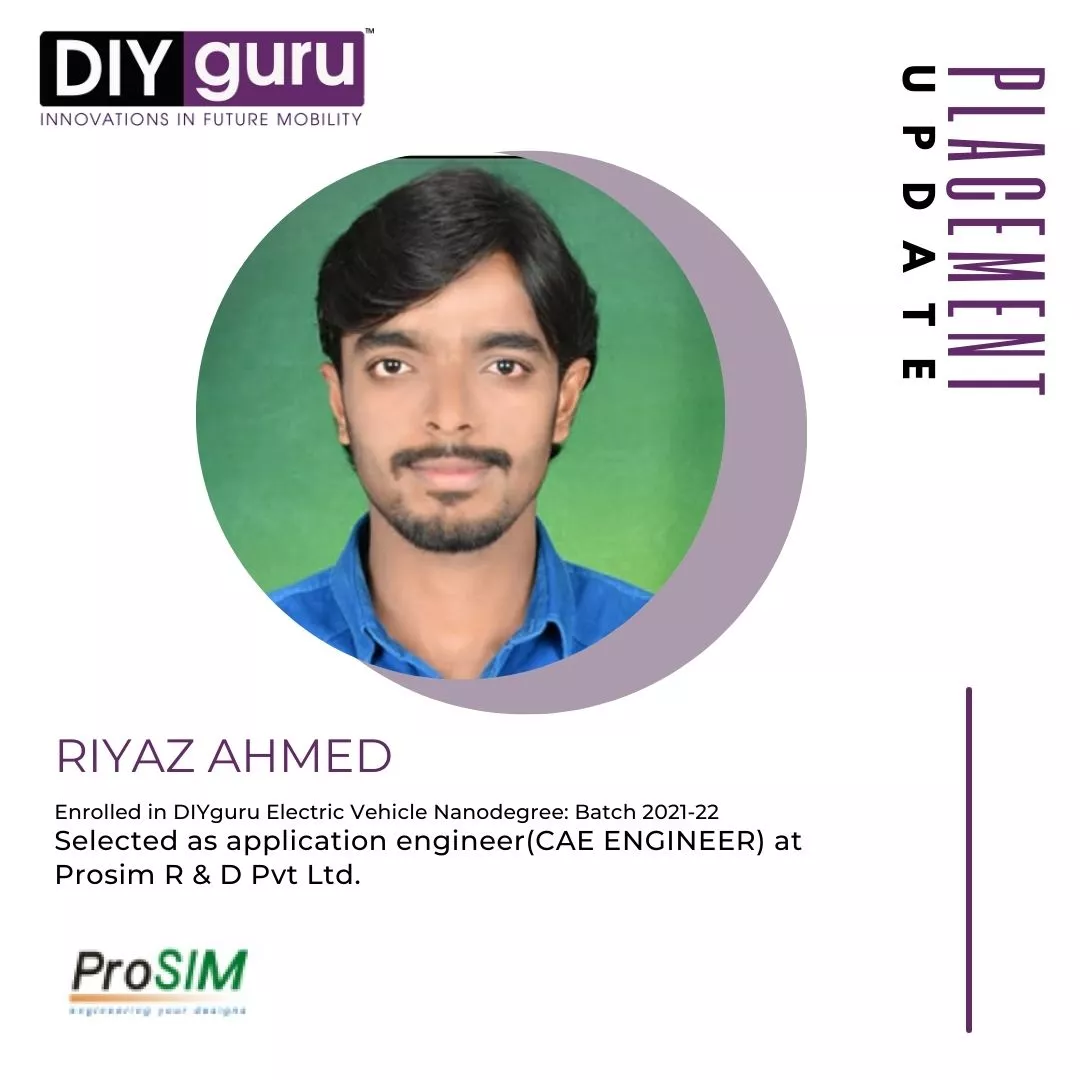

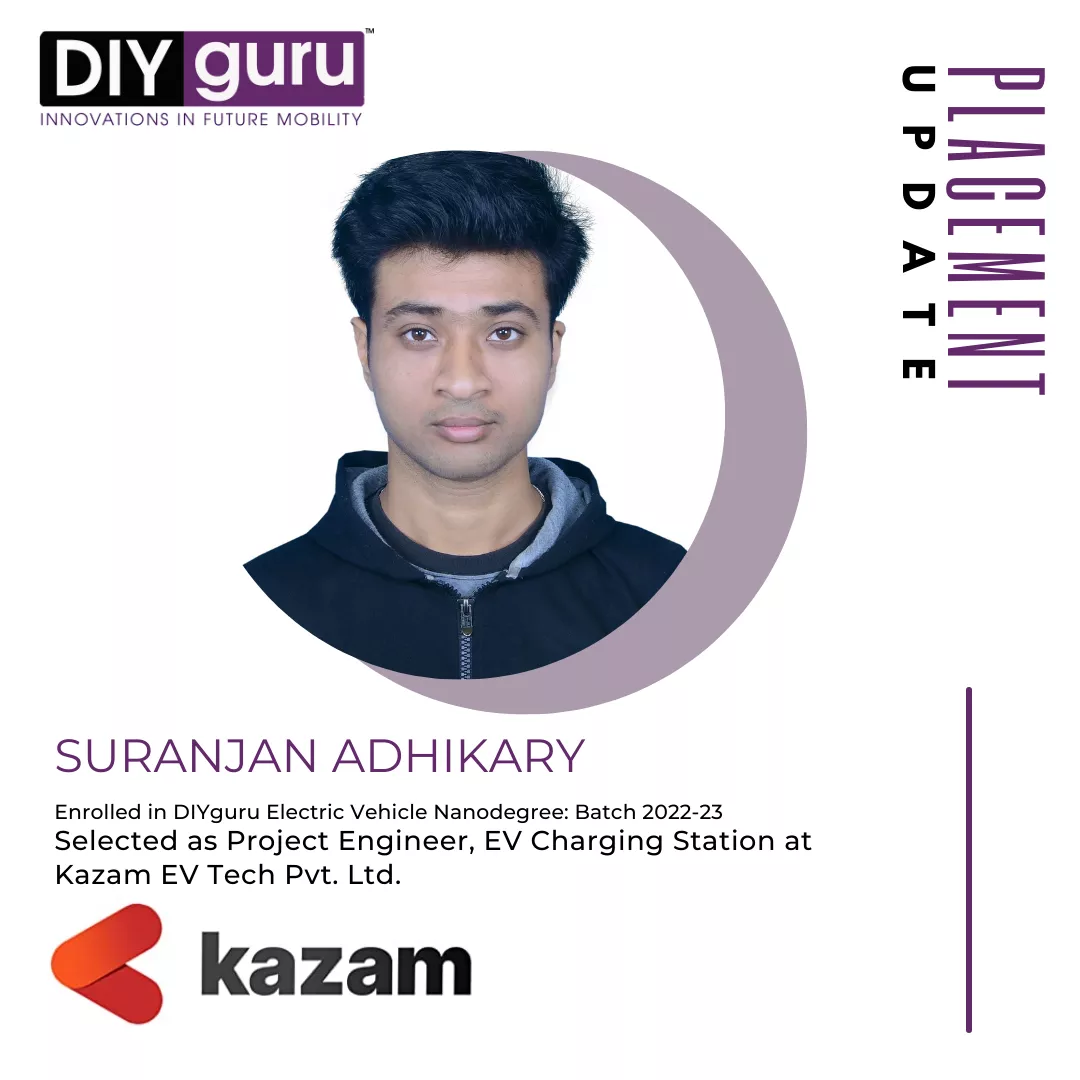
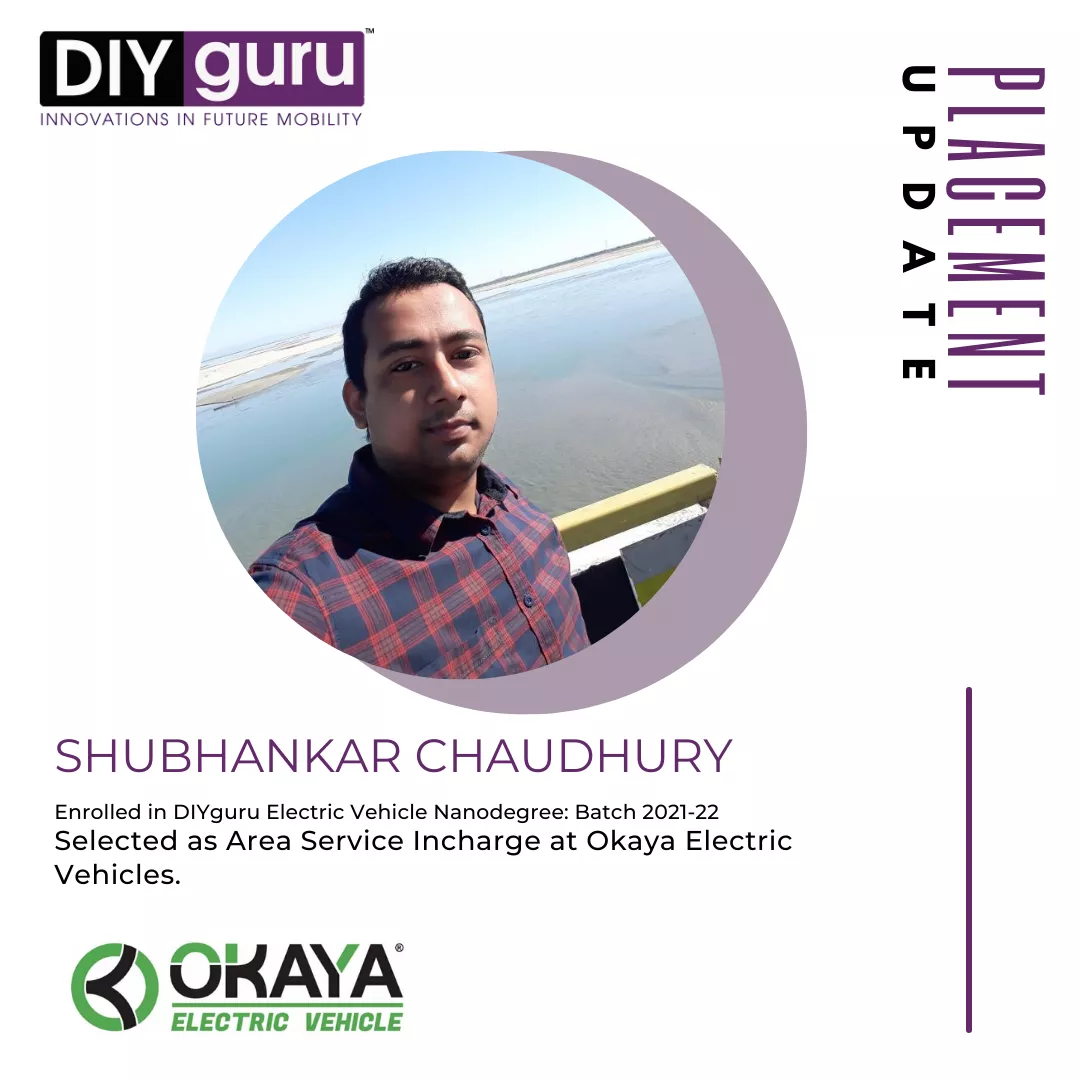
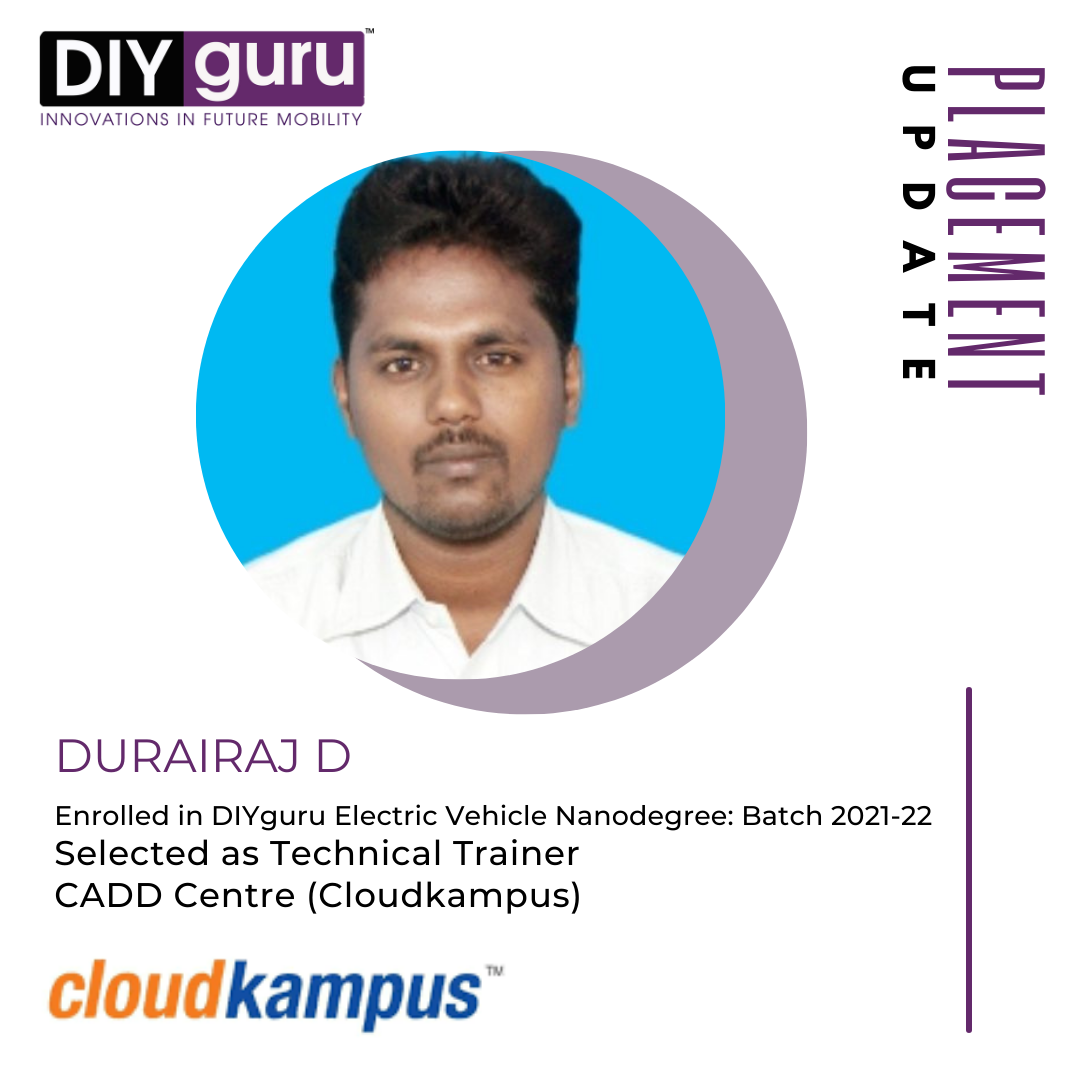
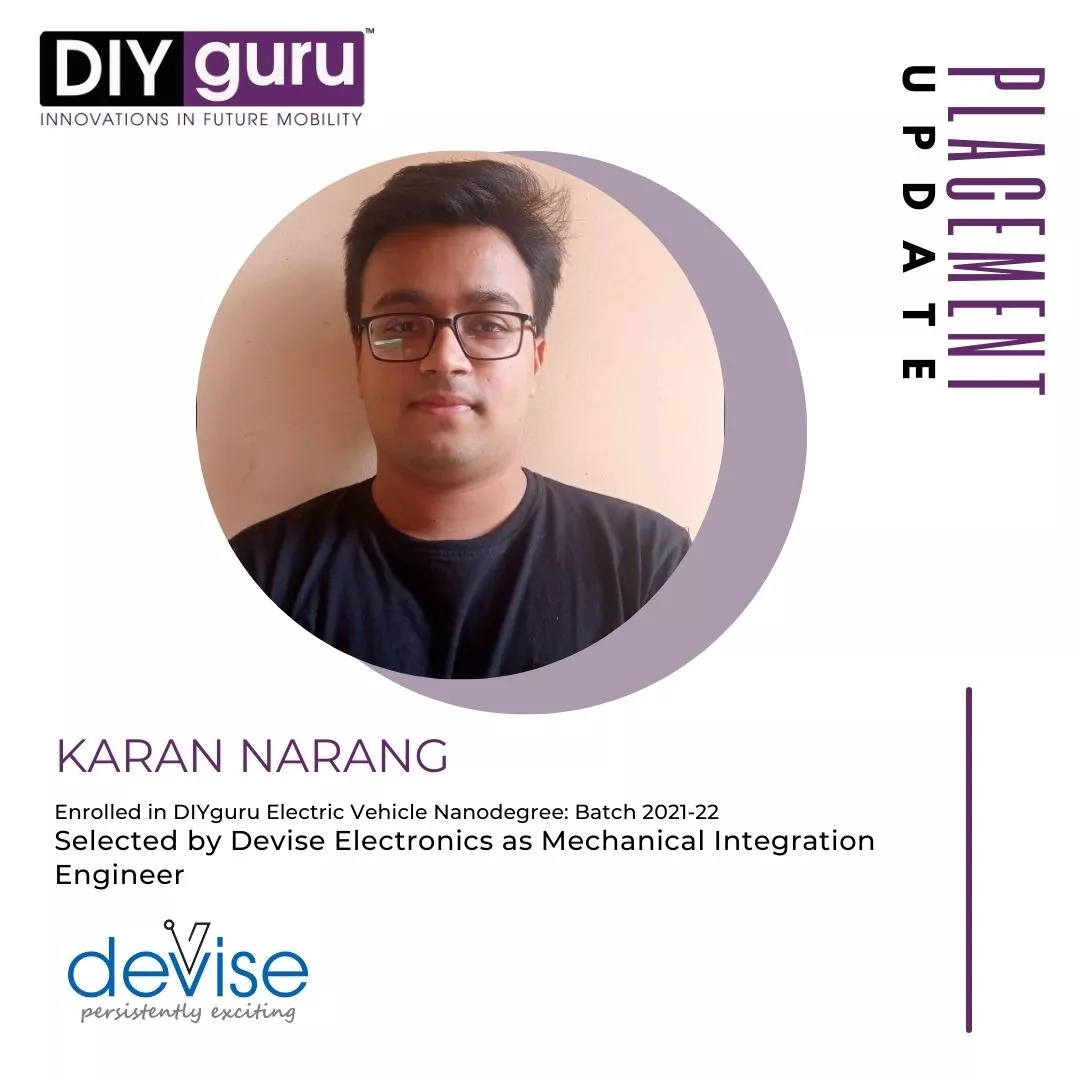
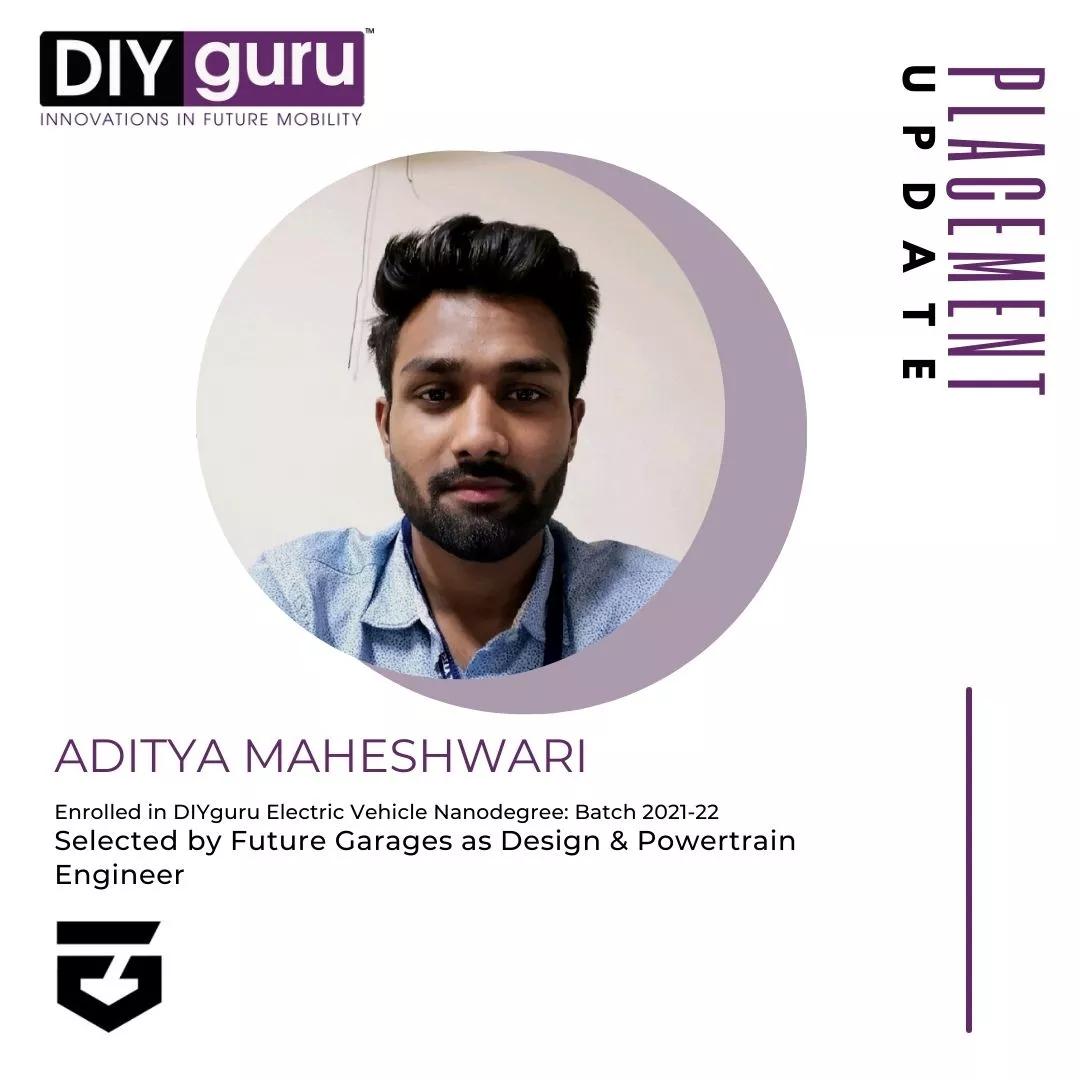
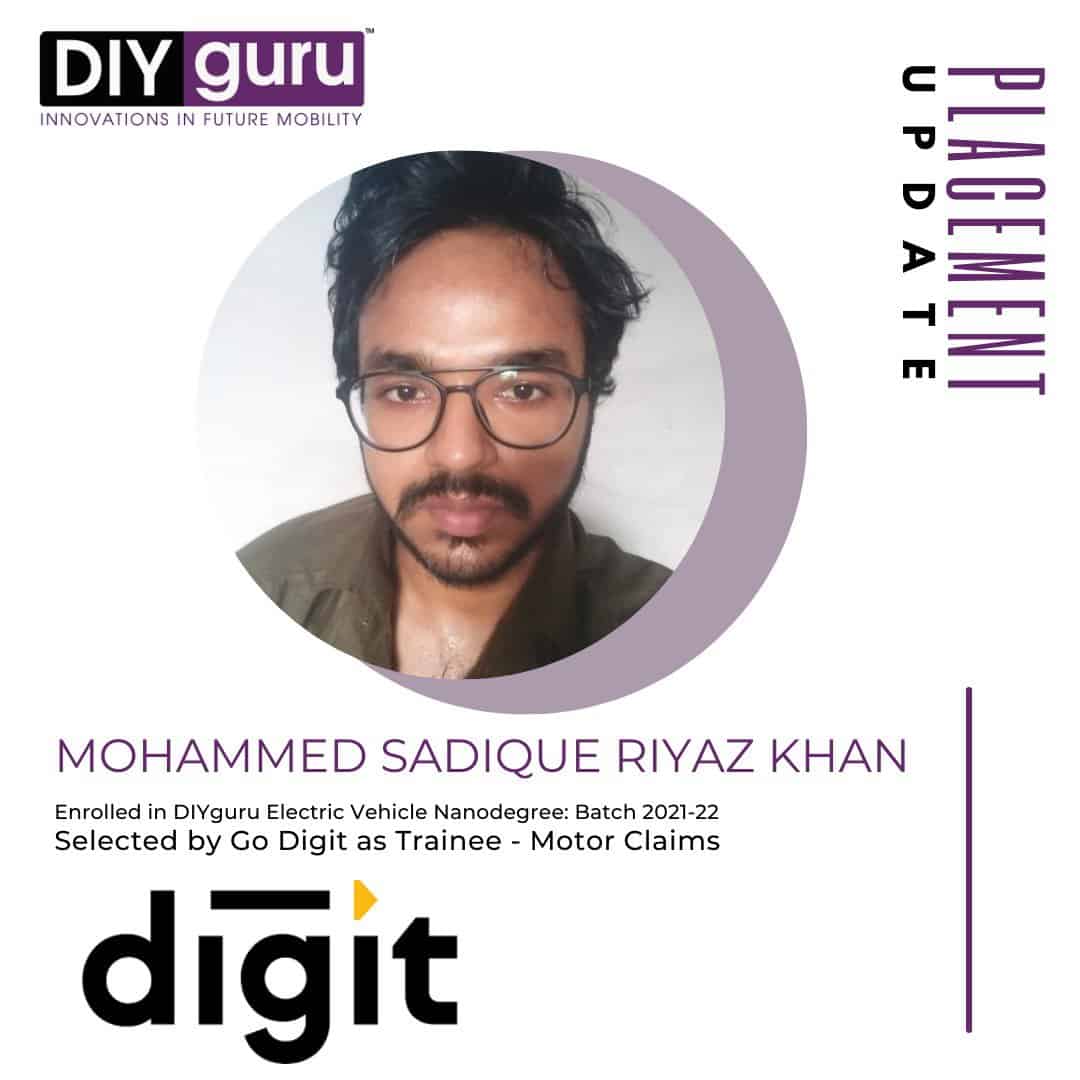
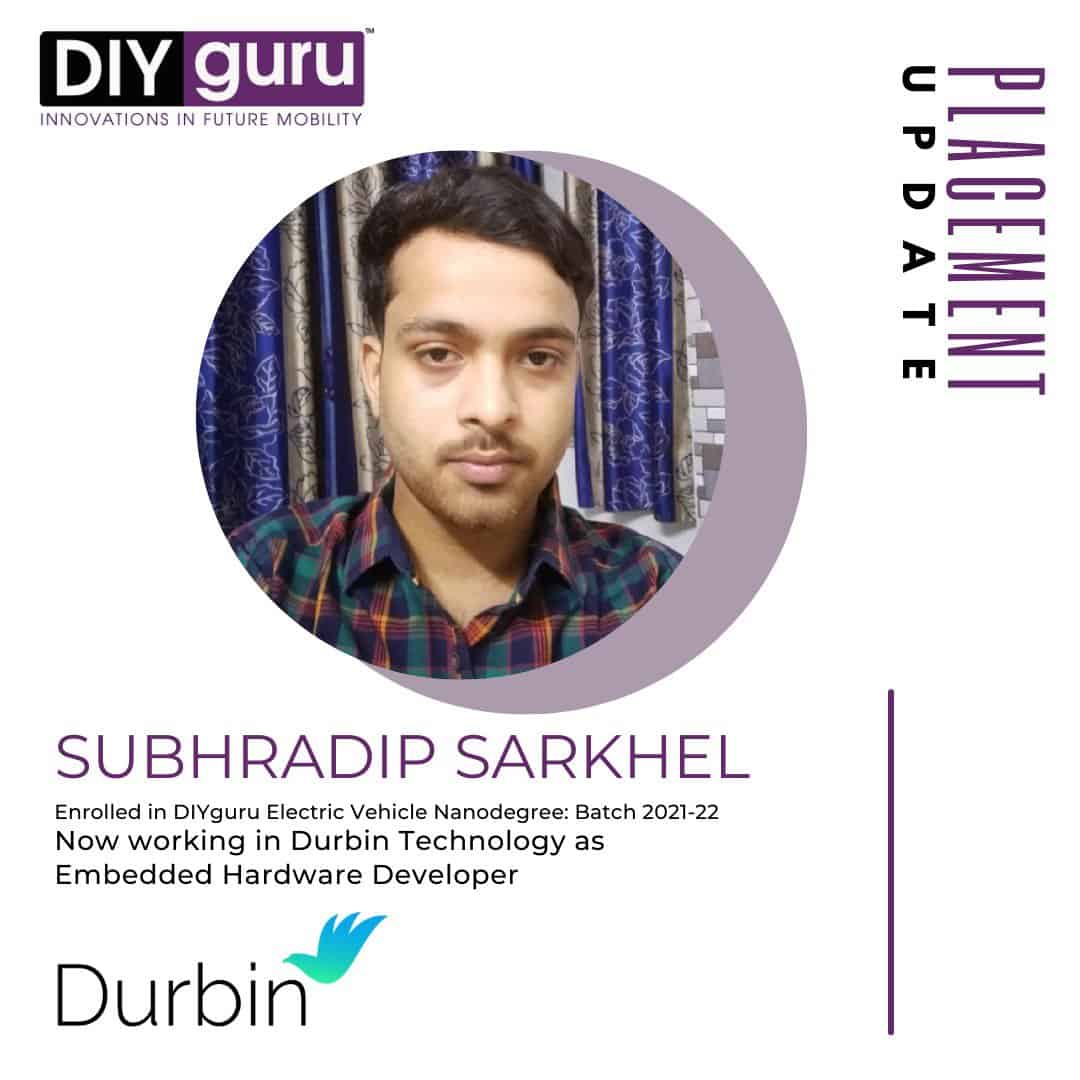
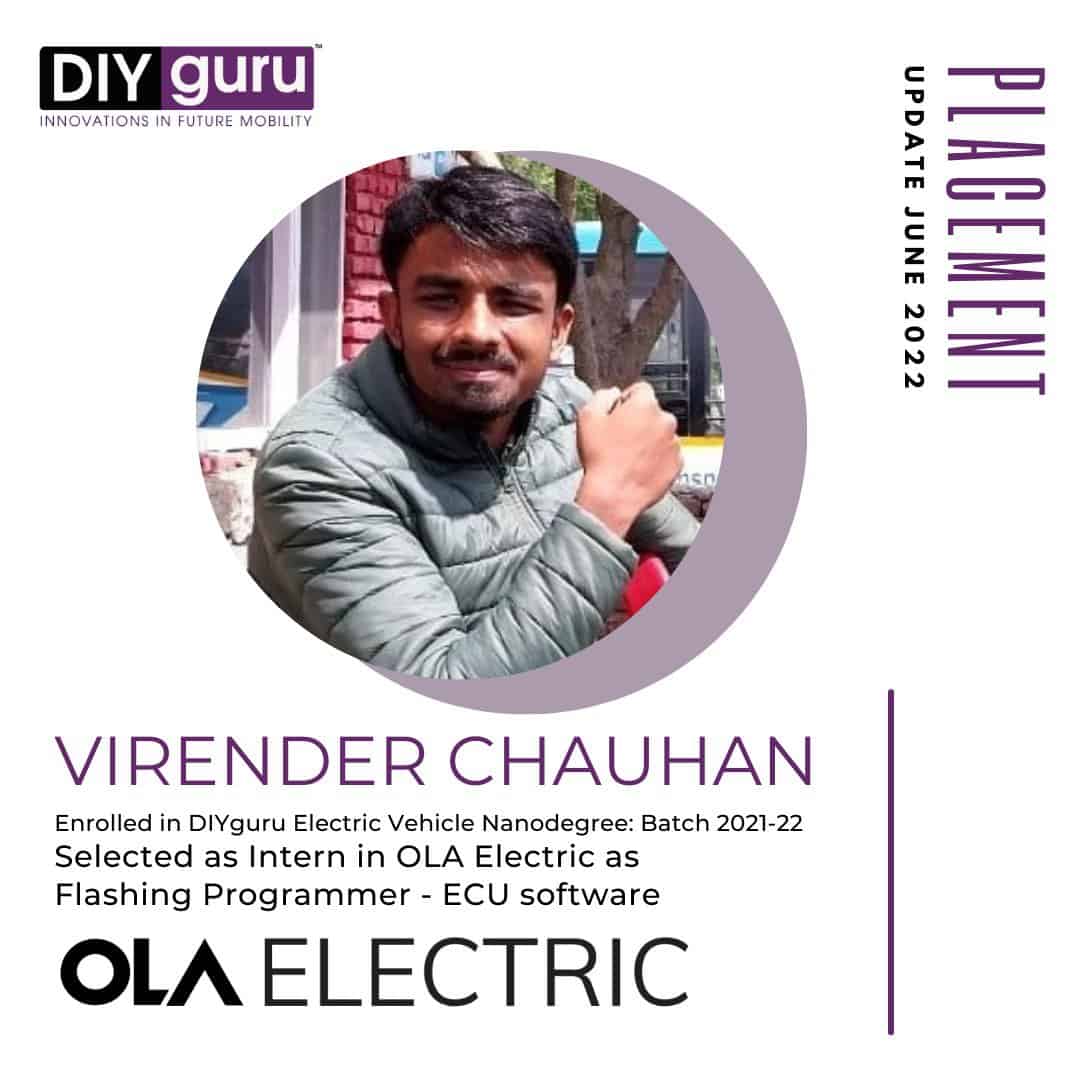
Featured In - Media Spotlight
Awards and Recognitions
Frequently Asked Questions
Specialization and Individual Courses can be done online mode only. To attend offline class you need to enroll for either Nanodegree or PG Diploma program.
DIYguru centers are located in Delhi, Pune, Bangalore, Nepal, Bangladesh, Malaysia and Germany. To see the address, check Contact section of website.
Yes, all the individual courses, Nanodegree Programs, Specialization Programs and PG Programs are govt. approved.
NEAT (National Education Alliance for Technology) - AICTE, Ministry of Education, Govt. of India & ASDC, Automotive Skills Development Council.
Min. 12th pass can undergo this course. Students and Working Professionals with ITI, Diploma, BE / B.Tech or equivalent in domains such as Automotive, Mechanical, Electrical, Electronics can pursue this course.
Three Month, however in case you are unable to finish the course in three month, you can request for an extension here - Contact.
Two minor Project + One Major Project (Mandatory)
No. For Practical Hands on Training, you need to enroll for either Nanodegree or PG Diploma Program.
Yes, DIY KITs are available for this course, To avail it simply click on enroll button and it will shop you the option of purchasing course specific DIY KIT.
Admission fee for this course is 20000 INR / 250 USD
During checkout, you will get the option of paying in EMI
You will be given 6 month access to this course, to get lifetime access, you need to pay 10,000 INR / 120 USD.
Admission process for individual courses is direct online, there is no requirement of any screening test. However for Nanodegree and PG programs, you need to appear for test before taking admission.
You can avail project based internship for this course upon successfull completion.
Stepwise procedure for the course enrollment with a 4-week internship project
- Step 1: Apply for the internship-based learning-based course and fill the application form.
- Step 2: Pay the necessary fee to enroll in the program.
- Step 3: The technical team of DIYuru will check your entered data, and will share the confirmation of acceptance as you will be shortlisted in the next 24 hours.
- Step 4: Once you are enrolled in the course, start working on the course videos, and given assignments, and complete the course at your own learning pace! With this, you shall receive the ‘course completion’ certificate.
Project-based Internship process
- Step 5: If you have applied for the ‘internship-based learning’, then the team DIYguru Support shall connect with you to share the date of the ‘live course certification examination!’. This examination will enable you to understand your current expertise and will allow us to define the best possible project for you! Students will get a minimum of 4 weeks for the examination preparation.
- Step 6: Once you clear the examination, the DIYguru technical mentors will contact you to enroll you in the ‘live project’. Since students will work on a live project, students will get enough time to prepare themselves before the internship project begins.
- Step 7:
Since it is an ‘internship’ based project, the students will be encouraged to work through the assigned project in teams and will be allowed to achieve the results on their own, with mentorship support from DIYguru! Allowing you to gain the actual skills as an ‘intern’! Enrolled students will get a minimum of 4-6 weeks to work and submit their project reports.
- DIYguru shall also allow you to work in groups or as an individual. However, at the end of the internship, each student shall submit a project report with all the results achieved, for evaluation by the DIYguru technical team.
- Every candidate after successful completion of the internship project shall also submit a pitch presentation video, explaining his/her project-oriented achievements and results, so that the participants can work on their communication and presentational skills simultaneously. With this, you shall receive the ‘Project-based internship’ certificate (along with evaluation score), and an ‘achievement badge’ to validate that you have successfully cleared the ‘certification examination’ (shareable on LinkedIn and other platforms).
The internship after the completion of course is unpaid.
Placement assistance in terms of access to the Job portal will be provided, and you will be added to the weekly job update newsletter section to receive opportunities available in our partner companies.
Still have questions? Get in touch
Related Blogs
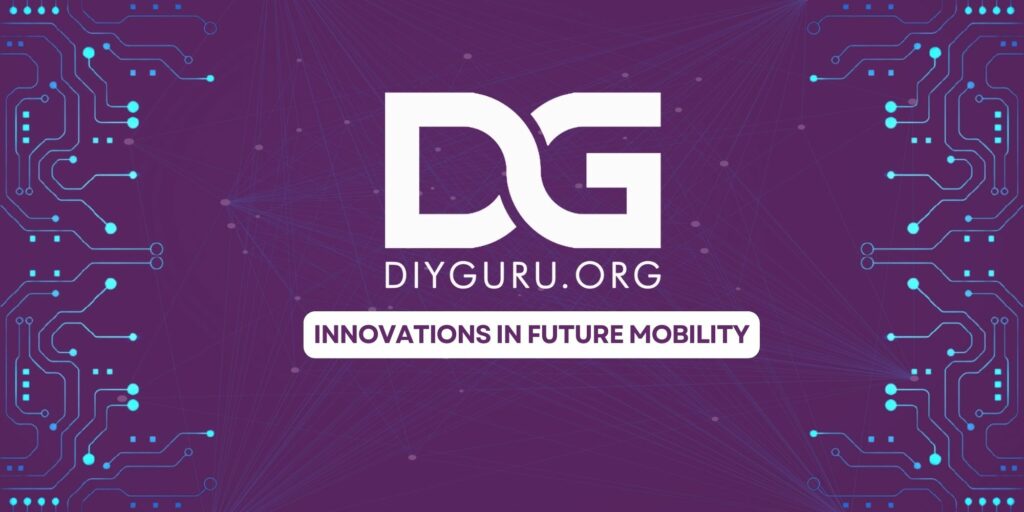
DIYguru Enhances EV Education with Upgraded PG Certification Programme
DIYguru announces the upgrade of its EV Nanodegree to a Post Graduate Certification Programme, offering existing Nanodegree students an enhanced curriculum and Post Graduate certification at no extra cost. Enrollment is open now.

Top 10 Beautiful Electric Vehicle Scooters for Girls in India 2024
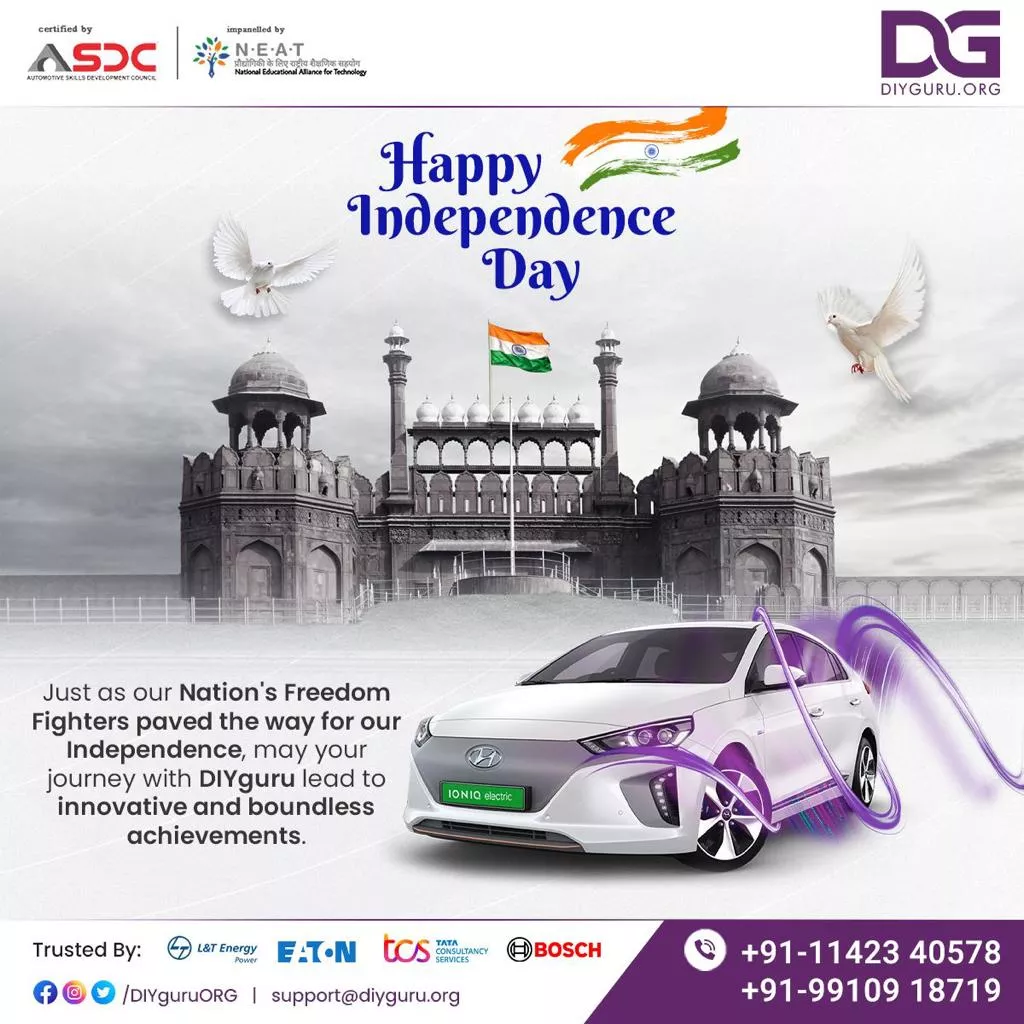
Revolutionizing Sustainable Future: DIYguru’s Visionary 77th Independence Day Speech on E-Mobility
Get in touch to learn more about how you can make the best of your talent
Spend less time worrying about job availability, and more time growing your knowledge. Join DIYguru Program today.
If you’re a current student, please get in touch through the DIYguru dashboard to ask about more details of this Program.
Please note, eligibility for this course is reserved to students who have done related projects and have relevant profiles matching with the pre-requisite of this course.
The DIYguru team hold the right to cancel your admisssion into the program without any explanation via email if found unsuitable and unfit.
Our 7-day money-back guarantee starts from the moment of signup and runs through the free week. Cancellations between days 7 and 30 will get a prorated refund.
Fees for the program is charged only when the admission is approved.


